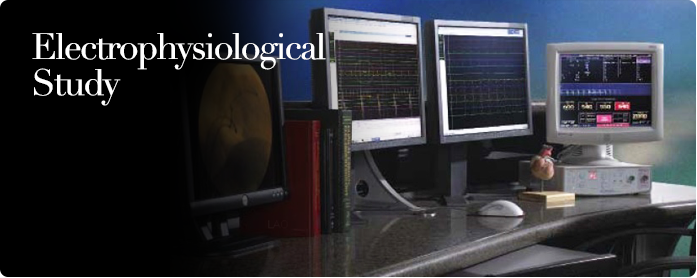| An electrophysiology (EP) study is a test used to study the conduction system of the heart. The conduction system consists of nerves, which conduct electricity within the heart and are responsible for the heartbeat. |
|
SOME INDICATIONS FOR ELECTROPHYSIOLOGICAL STUDY
- Palpitations
- Syncope
- Supraventricular Tachycardia
- Ventricular Tachycardia
- Wolff Parkinson White Syndrome
- Brugada Syndrome
- Atrial Fibrillation
|
|
| HOW THE PROCEDURE IS PERFORMED |
|
| An electrophysiology (EP) catheter is a catheter (wire or tube) with electrodes at the tip. Electrodes can record electrical signals and conduct electrical current from an external source to the inside of the heart. |
|
| EP catheters are inserted via a blood vessel in the groin and guided to the inside of the heart chambers with X rays. The function of the conduction system is thus studied. A tiny amount of electrical current is delivered to the heart through the catheters. This current is passed to the different parts of the heart through the nerves. In this way, it is possible to identify the normal nerves and the presence of additional (accessory) nerves. Areas of the heart that are scarred and do not conduct electricity can also be identified. |
|
| Patients who suffer from arrhythmias either have accessory nerves, or scarred muscle, or areas which discharge electricity autonomously, independent of the control of the normal pacemaker of the heart, the sinus node. |
|
| During the EP study, these causes are differentiated. The arrhythmia is induced and the cause is determined. The arrhythmia is then stopped. The patient is continuously monitored throughout and medical personnel trained in resuscitation are present throughout the study. The patient is usually sedated during the study. At the end of the procedure, all the catheters are removed and pressure is applied at the entry sites until bleeding has stopped. |
|
| After the procedure, the patient is put on bed rest for 6-8 hours and his vital signs are monitored in the hospital overnight. The next day, he is checked for bleeding and if there are no complications, he is discharged from hospital. Upon discharge, he may resume activities as instructed by his physician. |
|





